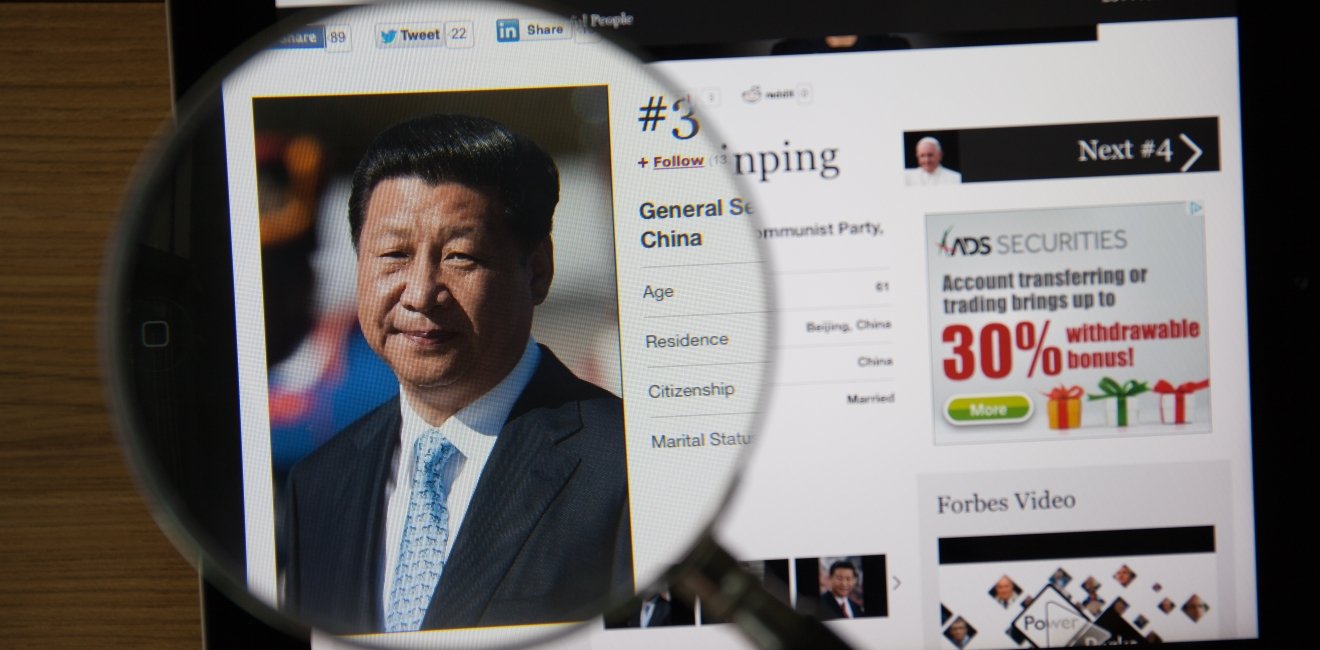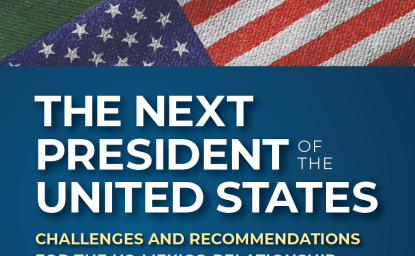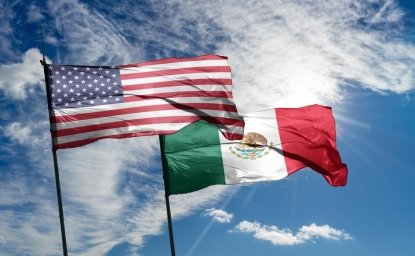In March 2016, a letter calling for President Xi Jinping’s resignation surfaced online right before the National People’s Congress (NPC) was set to take place. The authors, referred to only as “loyal Communist Party members,” cited concerns about Xi’s concentration of power and crackdown on dissent. The Party’s reaction to the letter was predictable: swift censorship and the detention of at least two dozen people, including relatives of those suspected of writing the letter. Prior to this year’s NPC meeting, which would vote on a constitutional amendment eliminating term limits for the president and vice president, words and phrases such as “I don’t agree,” “emperor,” and “constitution” were censored. As expected, the amendment passed nearly unanimously only two of 3,000 delegates voted against the amendment and three abstained), as did a new lineup of government officials that will help Xi achieve the “great rejuvenation of the Chinese nation.”
In Washington, there are rumors of trade wars, which President Trump said are “easy to win.” He announced tariffs on steel and aluminum imports earlier in March and vowed harsher actions targeting China investments in American and its treatment of U.S. intellectual property. These policy adjustments are unfolding against the backdrop of increasing uncertainty and rejection, by many, of America’s long-standing policy of engagement with China. Although policymakers on Capitol Hill are calling for more scrutiny of Chinese influence, for the first time in almost three decades, according to Gallup, more than 50 percent of American have a favorable opinion of China.
Sandy Pho
Senior Program Associate
Kissinger Institute on China and the United States
Major Issue Tracker
China as an Emerging Superpower
Top Armed Services Congressman Warns of China's Influence after Trip to Africa (March 1): “Wherever we’re going in Africa, they seem to be there, or following close behind,” Senator Jack Reed (D-R.I.) said of China. Related: Former Secretary of State Rex Tillerson’s speech in Africa highlights China’s approach with the Continent as “encouraging dependency”.
China Outbound Tourism Hits Record High in 2017 (March 5): Chinese people made 130.5 million trips overseas last year, a 7 percent jump over 2016, while total spending increased by 5 percent to an estimated $115.3 billion…Read More>>
China and India Flex Muscles Over Tiny Maldives (March 7): The Maldives is a small island nation strategically located in the Indian Ocean and traditionally in India’s sphere of influence. Beijing has poured millions of dollars recently as part of its Belt and Road Initiative and is now calling for calm as the Maldivian government is facing a political crisis. Watch this space. Related: Chinese Submarine Goes Deep in Indian Ocean.
Chinese Foreign Minister Denies China Trying to Supplant U.S. in Speech (March 8): “China will … participate more proactively in reforming and constructing global governance, in resolving regional and international hot issues ... and effectively coping with global challenges together with all parties,” Wang told reporters on the sidelines of the NPC. Read the transcript in Chinese and English.
China Dominates Self-Made Woman Rich List (March 8): The top four women in the report by publisher Hurun - and five of the top 10 - come from China…Read More>>
China’s War on Pollution Will Change the World (March 9): China is cracking down on pollution like never before, with new green policies so hard-hitting and extensive they can be felt across the world, transforming everything from electric vehicle demand to commodities markets. Great visuals.
China in Greenland: Mines, Science, and Nods to Independence (March 12): China avoids any signs of support for Greenland’s independence, but the topic is now open for academic discussion. Although it remains unstated, an independent Greenland with China as a key trade and investment partner and good political relations would be a valuable geopolitical asset in the context of China’s long-term Arctic strategy…Read More>>
NPC and Xi Jinping
- Xi Jinping is changing the constitution, but what’s his endgame?
- CPC leadership stressed in constitutional amendment
- The Five Most Important Moves in Xi’s Big China Cabinet Shake-Up (Global Times Infographic)
U.S. Asia Policy
Trump-Kim Summit
- Readout of President Donald J. Trump’s Call to President Xi Jinping of China
- Kim Jong Un Made a Surprise China Visit, Alleges Bloomberg report
- CGTN report of Xi-Kim Beijing talks, with initial photos of the visit
- Xinhua Readout: Xi Jinping, Kim Jong Un hold talks in Beijing
- Op-Ed: A Deal With North Korea Won't Happen Without China
A Counterproductive Cold War With China (March 2): Michael Swaine argues in this Foreign Affairs (subscription) piece: “By adopting an ideological and confrontational posture toward China, the Trump administration risks creating a pointless Cold War. What Asia needs is a far more constructive regional approach grounded in a stable balance of power and in mutual compromise.”
Beijing ‘strongly dissatisfied’ as Trump signs Taiwan Travel Act (March 17): As reported by the South China Morning Post, U.S. President Donald Trump signed new legislation allowing American officials to step up exchanges with Taiwan. Related: Taiwanese Given ‘Equal Status’ on China’s Mainland, but is Beijing Just Trying to Buy Their Support?
Military
China’s Military Expansion and Global Construction ‘Keeps Me Up at Night,’ Says U.S. Navy Secretary (March 8): “When it comes to China, the bottom line there is the checkbook,” Navy Secretary Richard V. Spencer said. “Not only in the dollars and cents that they are writing to support their military expansion and their technological work, but what they’re doing around the globe...weaponizing capital”…Read More>>
China Military Handed Control of Country’s Coast Guard (March 26): As part of the latest restructuring of state organizations,, the China Coast Guard will come under the administration of the People’s Armed Police (PAP), a paramilitary force that was itself recently put under the direct command of the Central Military Commission (CMC). The transfer is necessary “to fully implement the Party’s absolute leadership over the PLA and other armed forces,” the announcement said…Read More>>
Southeast Asia and the South China Sea
South China Sea Marine Park Proposed (March 6): A national park in the South China Sea is needed to better preserve the marine ecology in the region, deputies from China's top legislature said on the sidelines of the annual session of the National People's Congress…Read More>>
China's Debt-Trap Diplomacy Reaches the Philippines (March 6): According to the Business Insider, Chinese loans come with interest rates almost 12 times more expensive than Japanese loans (2-3 percent versus 0.25-.75 percent respectively). The money is used to fast-track infrastructure projects such as a dam, rail, and irrigation systems.
Technology, Surveillance, and Espionage
Chinese Tech Firm Joins MIT Initiative to Advance AI Research (March 1): SenseTime, a leading Chinese artificial intelligence (AI) company, said it has joined an initiative launched by Massachusetts Institute of Technology (MIT) to advance research on human and machine intelligence. More information can be found on MIT’s website.
China Presses Its Internet Censorship Efforts Across the Globe (March 2): According to the New York Times (subscription), Beijing is venturing outside the Great Firewall and paying more attention to what its citizens are saying on non-Chinese apps and services. As part of that shift, Beijing has at times pressured foreign companies like Google and Facebook, which are both blocked in China, to take down certain content.
iOS 11.3 Beta Suggests Apple Pay Transit Coming to Beijing and Shanghai (March 6): The transit feature is only available in Guangzhou at the moment, with the UnionPay cards. Code found in iOS 11.3 beta 4 suggests that the feature is going to expand to Beijing and Shanghai in the near future, although initially in beta…Read More>>
Here are the Real Reasons Trump Blocked Broadcom's Qualcomm Takeover (March 13): "The case that has been constructed is that, given Broadcom's business practices, the worry is that they will cut investment significantly, particularly in the 5G roadmap, weaken Qualcomm, as well as the U.S. position and allow Huawei, a Chinese company to take the lead," explained Stacy Rasgon, chip analyst at Bernstein. Related: Was Trump Right to Block Broadcom-Qualcomm Deal? It Depends Who You Ask; China Eyes Leading Role in Global 5G.
Microsoft and 21ViaNet Extend Cloud Services Partnership in China (March 15): Microsoft announced they have agreed with the leading Chinese data center services provider, 21Vianet, to extend their cloud services partnership. This agreement means Chinese customers can continue to experience Microsoft’s world-class public cloud services…Read More>>
In Email to Hosts, Airbnb announces it will turn over Data to Chinese Government (March 28): As reported by Buzzfeed News, Airbnb spokesperson said that the information it collects is similar to information "hotels in China have collected for decades."
Media, Soft Power, and Censorship
An Hourly Marriott Employee Was Fired for Liking a Tweet (March 3): The tweet the employee “liked” had been posted by a Tibetan separatist group that had praise Marriott for listing Tibet as a sovereign state in a customer survey. Related: Marriott Apologizes to China Over Tibet and Taiwan Error.
A Stronger China is Giving the World ‘More and More Security’, Communist Party Newspaper Says (March 5): In an editorial waxing lyrical about Chinese blockbuster movie "Operation Red Sea," the powerful Chinese Communist Party-owned newspaper took the opportunity to laud the country's military operations. Related: China’s Movie Industry Undergoes a Patriotic Makeover in the New Era.
Favorable Views of China Keep Climbing In Spite of Political Tensions (March 6): According to Gallup, China's favorability has increased markedly over the past two years, with a majority (53%) now having a favorable view of China for the first time since early 1989. Last year, China's favorable rating rose to 50% from 44% during the previous two years.
Beijing Bulks up Diplomacy Budget as China Extends Global Reach (March 6): According to the South China Morning Post, Beijing is planning to increase spending on diplomacy by 15.6 per cent to 60 billion yuan (US$9.45 billion), while the defense budget would grow by 8.1 per cent to 1.1 trillion yuan. Related: China to Restructure Foreign Affairs Team.
Black Panther in China (March 11): “Black Panther” opened on top of the China box office with a strong $66 million gross, defying doubts that Chinese audiences would warm to a movie with black lead actors…Read More>>
Neither Black Nor White in the Mississippi Delta (March 13): Two photographers document a community of Chinese-Americans in the birthplace of the blues for the New York Times (subscription).
U.S.-Backed Culture Centers Under Pressure in China (March 13): The U.S. State Department documented more than 150 examples of Chinese interference in American public diplomacy efforts between January 2016 and April 2017, carried out in the name of countering “hostile foreign forces” – alleged saboteurs plotting to overthrow the Communist Party’s rule.
Documentary ‘People’s Republic of Desire’ Wins Top Prize at SXSW (March 13): South by Southwest (SXSW) is a high-profile tech, music and movie festival that takes place in Austin, Texas. Best documentary went to “People’s Republic of Desire,” director Hao Wu’s exploration of the surreal existences of “live-streaming” social media stars in China. Related: How Two Documentary Films Are Opening Windows on Modern China in the Age of Trump.
Beijing Film Festival removes Oscar-Winning LGBTQ Film from Roster (March 26): The Beijing International Film Festival has dropped the Oscar-winning gay romance Call Me By Your Name, a move that highlights the lack of progress for LGBTQ rights in China. The censorship of the film occurred just days after China shifted control of all its film and media to the Department of Propaganda and, on the digital front, banned video spoofs and parodies. Read More>>
Education and NGOs
China’s Long Arm Reaches Into American Campuses (March 7): According to Foreign Policy (subscription), while many countries, including the United States, fund educational activities abroad, the Chinese government’s direct support for, and control over, student groups appears to be unique. Beijing’s influence over these groups is also beginning to raise questions and concerns among Chinese students on American campuses, who fear they will be accused of being agents of espionage.
Chinese Students in America Say ‘Not My President’ (March 7): Another great article by Foreign Policy’s (subscription), Bethany Allen-Ebrahimian on how young overseas Chinese are expressing opposition to the Party’s proposal to eliminate presidential term limits. The National People’s Congress unanimously (there were only two “no” votes, and three abstentions out of 3,000 delegates) voted to remove term limits in March.
U.S. Postsecondary Enrollments in Mandarin Fall (March 9): Although the total enrollments in languages other than English fell 9.2% between fall 2013 and Fall 2016 (the second-largest decline in the history of the MLA’s census), the decline in enrollments in Mandarin classes was significantly greater than that…Read More>>
Congressional Proposal Targets Confucius Institutes as Foreign Agents (March 14): As reported by Foreign Policy (subscription), a new draft proposal in the House of Representatives seeks to require China’s cultural outposts in the United States, the Confucius Institutes, to register as foreign agents. Related: Magic Weapons: China's Political Influence Activities Under Xi Jinping
Trade and Economic Relations
Chinese Investors Pump New Dollars Into Maryland’s Pharmaceutical Industry (March 4): A consortium of Chinese private equity funds are investing up to $250 million to create a biotech firm that seeks to build on the work of Gaithersburg-based MedImmune, bringing 100 jobs to Montgomery County’s biotechnology corridor. Related: U.S. Approves China-Made Biological HIV Drug.
Is the U.S. Ready for a Trade War? (March 6): Writing for YaleGlobal Online, Scott Kennedy, agrees that China distorts the global economy with discriminatory policies, seeking to dominate key industries through subsidies and over-production. Yet he also maintains that the United States is woefully unprepared for a potential trade war in five ways. Related:
- Marco Rubio: To Fight China on Trade, We Need More Than Tariffs (subscription)
- Trump Demands Aides Pump Up Anti-China Tariffs
- White House Pressing China to Cut Trade Surplus by $100bn
- How China Pushes the Limits on Military Technology Transfer (Wall Street Journal Op-ed)
Trump Alienates Allies Needed for a Trade Fight With China (March 7): According to the Wall Street Journal (subscription), there is an opportunity for Trump to lead a coalition against China’s predatory trade behavior. Instead, he is threatening trade war with the countries that would make up such a coalition, over commodities that are much less vital to the U.S.’s economy and national security than the sectors threatened by China’s expropriation of intellectual property. Related: Asia Pacific Nations Sign Sweeping Trade Deal without United States; The U.S. Businesses at Risk From Trade War With China;
China’s Top Economic Adviser Liu He Still Doesn’t Know Who to Talk to in U.S. About Trade (March 7): A key mission for China’s top economic adviser when he visited the United States was figuring out who to talk to in the U.S. administration about a looming trade war, but sources said chaotic changes in the White House hampered those efforts…Read More>>
China's ICBC Ordered by Federal Reserve to Boost Money-Laundering Safeguards (March 13): The Fed found “significant deficiencies” in safeguards at the Chinese bank’s New York branch, the U.S. regulator said in an enforcement order released Tuesday. The company agreed to submit plans to fix its compliance programs within 60 days, the Fed said. No financial penalty was imposed…Read More>>
Why China Loves American Chain Restaurants So Much (March 20): The desire for American “status symbol” dishes might be fading. In recent years, as China’s economy has soared and the middle-class has grown, market share for these classic American companies is decreasing as more Chinese companies enter the scene…Read More>>
If You Read/Watched Nothing Else in March…
The fine writing and film/videography on U.S.-China relations published each month far exceeds the assimilating capacity of any institution. It would be ridiculous to feature “the best” efforts of the past 31 days, but KICUS would like to highlight the following work nonetheless:
Op-Eds and Commentary
Is a Trade War the Only Option? (Daniel Rosen, Foreign Affairs [subscription], March 20)
A Foreign Policy in Asia that works at Home (Elizabeth Warren, Boston Globe, March 25)
Articles/Essays
How China Interfered in Australia and How Democracies Can Push Back (John Garnaut, Foreign Affairs [subscription], March 9)
China’s Global Dreams Give Its Neighbors Nightmares (Robert Daly and Matthew Rojansky, Foreign Policy [subscription], March 12)
Understanding the Big Downsides—And Potential Benefits—of the Proposed Trump-Kim Meeting (Jeffrey A. Bader, Order from Chaos-Brookings, March 12)
Policy Paper
Examining the Debt Implications of the Belt and Road Initiative from a Policy Perspective (John Hurley, Scott Morris, and Gailyn Portelance, Center for Global Development)
Blog Posts
Succession Politics and the Cost of Eliminating Presidential Term Limits in China (Taisu Zhang, Lawfare, March 9)
Books
China's Great Wall of Debt: Shadow Banks, Ghost Cities, Massive Loans, and the End of the Chinese Miracle (Dinny McMahon, Houghton Mifflin Harcourt, March 13)
End of an Era: How China’s Authoritarian Revival is Undermining Its Rise (Carl Minzner, Oxford University Press, March 1st )
Video
A Chinese reporter’s Frustrated Eye Roll goes viral in China, and is Censored (The Verge, March 13)
Author

Kissinger Institute on China and the United States
The Kissinger Institute works to ensure that China policy serves American long-term interests and is founded in understanding of historical and cultural factors in bilateral relations and in accurate assessment of the aspirations of China’s government and people. Read more





